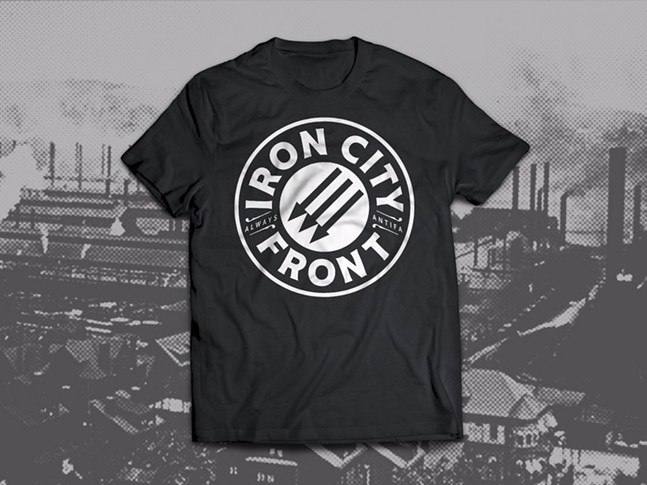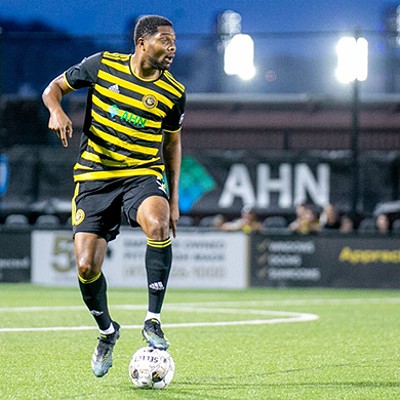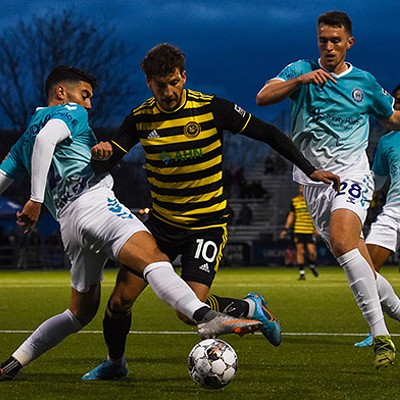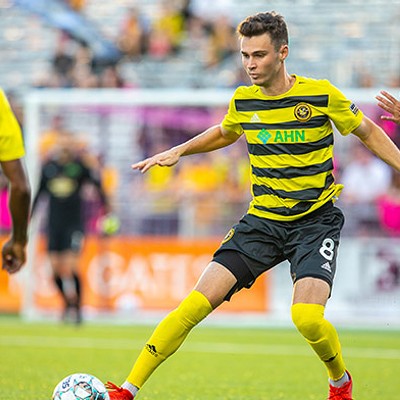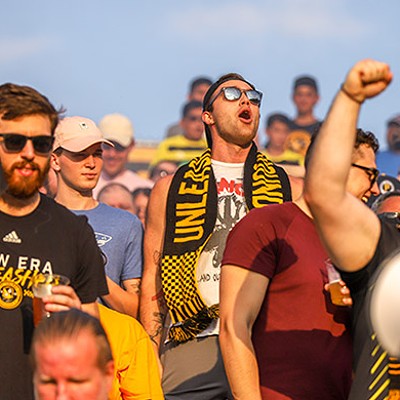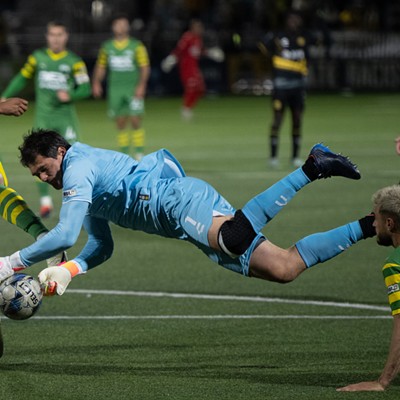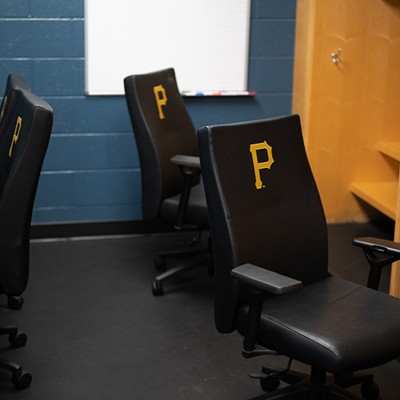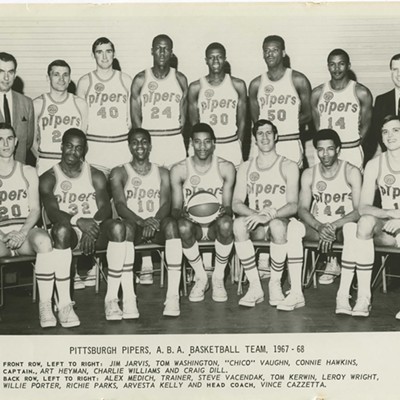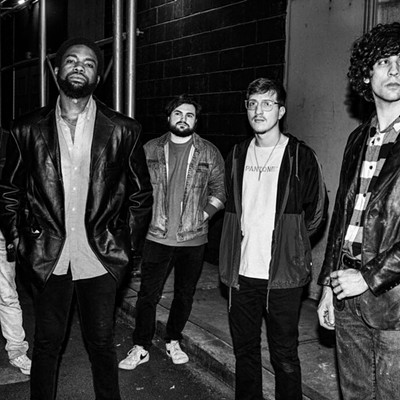Pittsburgh City Paper asked ICF questions over email about the group's origin story, goals, and the place of political beliefs in professional sports. The organizers of ICF opted to answer these questions collectively.
This interview has been edited and condensed for length and clarity.
What are supporters’ groups, and how are they different from traditional American sports fandoms?
It was pretty common in the early days of soccer — including in the U.S. — for fans to be heavily involved in the operation, founding, or even collective possession of the club. In a lot of cases, the team itself would be an extension of something that already existed, like a sporting club fielding teams in several sports, co-workers at a factory, or even regulars at a given bar. A true sense of, and sometimes literal, ownership came with that.
We definitely see echoes of this reflected in the way supporters’ groups genuinely participate in the atmosphere of games and even influence them. They collectively write and lead their own chants and songs they'll sing together throughout the game, make their own banners and flags reflecting their unique taste and views, and sometimes develop their own relationship and influence with the team's ownership and management.
Yet it’s telling that we’ve grown accustomed to very top-down models of sports ownership in the U.S. and elsewhere. We’re trained to think of sports and all things as a business and to think of business as sport in a really bizarre way that’s often tied together with rituals of owner worship. It leaves fans powerless and constantly reacting to decisions they had no part in making, which usually ends with needing someone else to blame. This is no way to live or love.
Obviously we don’t own the Hounds (yet?) but we’d like to do less scapegoating than Steelers fans or most anyone in our mainstream social-political discourse. And that feels real doable.
How long have you been fans of the Riverhounds? When did you decide to make your own supporters’ group?
Some of us saw our first Hounds game back when they played in Bethel Park; others just started in the last couple of seasons to hang out with friends and drink cheap beer.
Most of us are involved in existing social or political movements in the area and we kept running into people we recognized from rallies and meetings and such at Riverhounds games. It just happened often enough last season that a few of us realized that we probably had the people we needed to make a group of our own built around that shared political worldview.
Creating spaces where all kinds of marginalized people are welcome and folks doing the work to build a more just world can enjoy themselves is really important to us, whether it’s in a soccer stadium or anywhere else.
What made you want to be an overtly political group? Was there an event that acted as a catalyst?Welcome to the Iron City Front!
— ⚒IronCityFront🌾 (@IronCityFront) December 19, 2019
Our goals can be found below:
1. Provide a network of support for our members and supporters
I think the easy answer is that we all mostly know each other through our political work and organizations. It seemed natural to rally around both our politics and our love for the Riverhounds. But one of the main catalysts was talking with each other about MLS’ ban on political symbols last season.
The ban was meant to target anti-fascist symbols. The league faced such a huge response from anti-fascist fans that they lifted the ban. It was powerful to see MLS give in to the fans and it was a reminder to us that there is no soccer without the fans. Like how there are no schools without students and teachers, there are no bus rides without bus drivers, or restaurants without dishwashers. Anything and everything can come to a halt if we get together and decide to stop something, because everyday people are the ones doing all of the work.
With a lot of major sports, like football or baseball, athletes and fans are discouraged from (and sometimes punished for) making politically progressive statements. Is it a different story with soccer?
Yes and no. U.S. Women’s National Team and Reign FC star Megan Rapinoe was [one of the first white athletes] to follow Colin Kaepernick’s lead in kneeling during the national anthem to protest discriminatory, violent policing of Black communities and she personally faced no meaningful retaliation from NWSL or U.S Soccer. After the final whistle blew in the USWNT’s victorious World Cup Final this past summer, the crowd chanted “equal pay” in support of the players’ ongoing lawsuit for pay equity with the Men’s National Team and nothing happened to them.
But on the other hand, it’s much harder to find a politically outspoken male player, U.S. Soccer did still respond to Rapinoe’s protest with a rule requiring all players to stand during the anthem. An unfortunate side-effect of the sport’s growing popularity — and profitability — is that there will likely come a growing pressure from wealthy people at the top to drain soccer of that unique grassroots spirit it has now. If anything, that’s what makes it so important to carve out a space that puts tight-knit communities at the center of the fandom right now.
You have a set of goals listed on your Twitter — how do you plan to put those into action?
At the most basic level, just being kind, decent, and welcoming people to everyone who’s willing to extend that respect to everyone else in the group. We’ll be organizing tailgates, watch parties, and other events to build that camaraderie with each other. And we’re really excited to use the group as a vehicle for supporting other local groups doing the work to build a more just community.
For example, 80% of the post-cost money we make from our first round of shirt sales will go to Bukit Bail Fund, which provides support for folks incarcerated in Allegheny County Jail. Of the inmates there, 75% are diagnosed with mental illness and/or substance abuse disorders and 81% have not been convicted of any crime but don’t have the money or connections to afford bail out of a system that disproportionately affects all sorts of marginalized communities. We’re looking forward to adding other groups to that mix and possibly even pursuing our own justice-driven initiatives.
How can people support Iron City Front?
What you can do right now is buy one of our shirts to support good local causes and build our club infrastructure. You can also follow us on Twitter and Instagram. Once the season gets started, we’ll be starting up pre-game tailgates and away game watch parties which we’ll post details about on those social media channels. And if all else fails, you’ll definitely be able to find us in the supporter section of the stands on game days so folks should feel welcome to come join us there.

